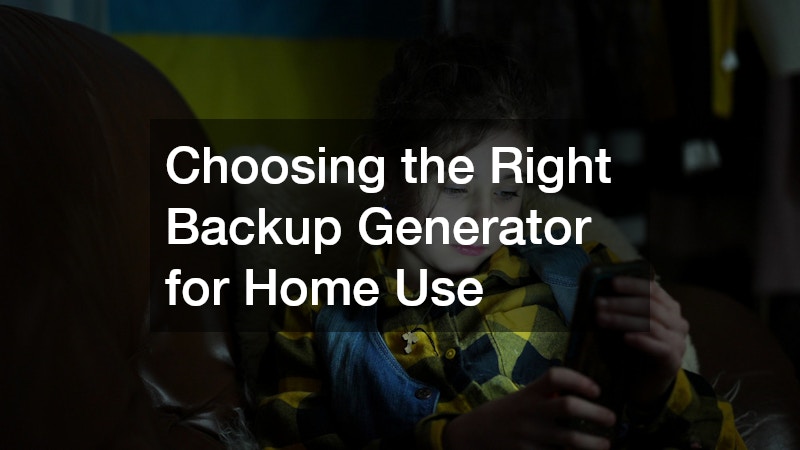Choosing the right backup generator for home use is crucial for ensuring that your home remains powered during outages. This article delves into key considerations for selecting an optimal generator for home use, answering common questions to guide homeowners in their choices.
What Size Generator Do I Need for My Home?
Understanding the power requirements of your home is essential to choose the right generator size. First, assess the wattage requirements of the appliances and devices you want to power during an outage. This involves making a list of essential equipment such as refrigerators, lights, and medical devices, then calculating the starting and running wattage needed. A useful approach is to categorize your appliances into two groups: those that run continuously and those that require additional power to start.
Next, it’s essential to consider the total load you anticipate using simultaneously. A generator that can handle this load will prevent overloading and ensure that your home maintains power without interruption. Many homeowners opt for a generator with a slightly higher capacity than their calculated needs to account for any unforeseen requirements that may arise, especially during peak usage times.
For example, if your total wattage requirement is 5000 watts, selecting a generator rated for about 6000-7500 watts could provide the necessary buffer. By ensuring you have adequate power capacity, you can power everything essential at home during an outage and avoid the frustration that comes from a generator that falls short of your needs.
What Types of Generators Are Available for Home Use?
Diving into the different types of generators reveals several options tailored to various needs. Portable generators are a popular choice for homeowners who want flexibility and mobility, as they can be moved easily to where power is needed most. However, these generators often require manual setup and connections to home circuits, which may be inconvenient during an emergency.
Standby generators, on the other hand, provide an automatic solution. These systems are permanently installed and are capable of detecting power outages, automatically starting themselves while connecting to the home’s electrical system. While typically more expensive than portable units, the convenience and peace of mind they offer during an outage can be invaluable for homeowners.
Inverter generators serve a different purpose compared to traditional generators. These models are designed to provide stable electricity at a consistent voltage, making them suitable for sensitive electronics. They tend to be quieter run and more fuel-efficient than other types, making them an excellent option for homeowners seeking a balance between power and environmental considerations.
How Much Should I Expect to Spend on a Backup Generator?
Discussing the budget considerations involves evaluating both immediate and long-term costs associated with backup generators. The initial cost of the generator varies significantly based on its type, size, and features. Portable generators typically range from a few hundred to several thousand dollars, while standby models can start from around $2,000 and go up to $10,000 or more, including installation.
Installation costs should also be factored into the overall budget. Standby generators require professional installation, which can add several hundred dollars to the total price. You’ll want to verify local codes and regulations, as this might affect installation requirements and costs. Additionally, you should consider maintenance expenses over the generator’s lifespan, which can include oil changes, filter replacements, and general upkeep to keep the unit in good working order.
Fuel expenses can be another ongoing cost that varies based on your usage and the fuel type of your generator. Gasoline, propane, and diesel each have different price points and efficiencies that may affect your overall spending. By understanding these costs, you can better prepare for the financial commitment of owning a backup generator, ensuring that you’re ready for unexpected power outages without breaking the bank.
What Features Should I Look For in a Backup Generator?
Exploring important features like fuel type, noise level, run time, and safety features to look for in a generator is vital for making an informed decision. Fuel type plays a significant role in determining how easily you can obtain fuel during an outage, as well as the generator’s efficiency and running costs. Gasoline generators are common, but propane and diesel options can also be considered based on availability in your area.
Noise level is another critical aspect, especially if you live in a residential area where noise restrictions might apply. Some generators operate quietly, while others can be quite loud. It’s important to choose a model that won’t disturb your household or your neighbors. Additionally, check for sound ratings in decibels to ensure you select a generator that meets your noise tolerance.
Run time is crucial as it determines how long a generator can operate on a single tank of fuel. A longer run time can provide peace of mind during prolonged power outages. Always examine the manufacturer’s specs for run time at moderate loads. Finally, safety features such as automatic shut-off mechanisms, low-oil shutoff, and carbon monoxide detectors are indispensable for protecting you and your family during operation.
Selecting the right backup generator requires careful consideration of size, type, cost, and features. By addressing these key areas, homeowners can ensure their choice provides reliable power during outages, safeguarding their homes and peace of mind. Comprehensive research alongside thoughtful budget planning ensures you can confidently invest in a generator that meets your household needs.


